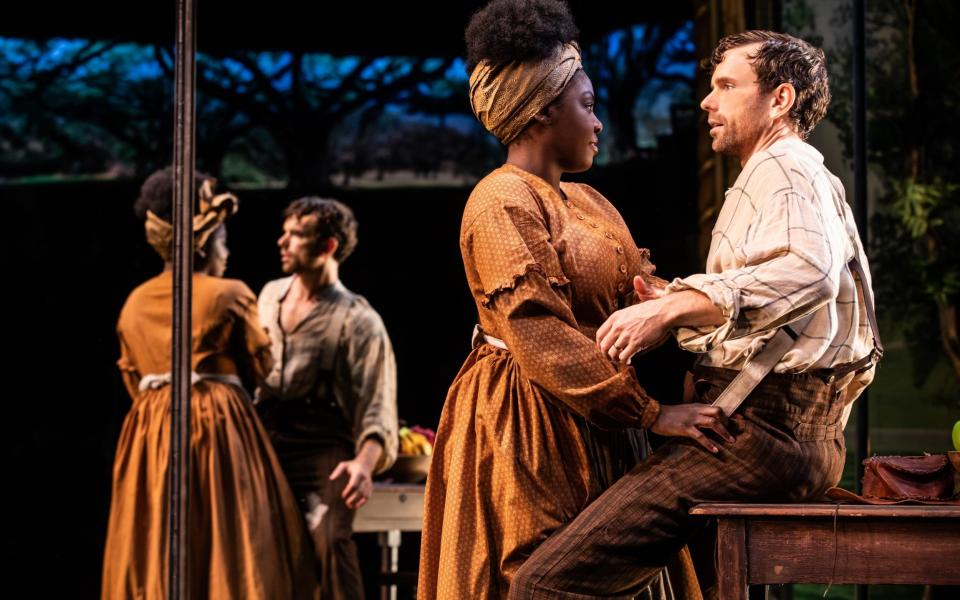“Is London ready for Slave Play?” asks the booking site for the London relocation of Jeremy O’Harris’ drama about race, sexuality, and the psychological legacy of slavery. It’s a good question. Slave Play is Broadway’s most critically acclaimed show in decades (it has received the most Tony nominations ever), but it’s also its most divisive.
It is difficult to discuss the particular provocativeness of Slave Play without revealing a key plot point. In any case, suffice it to say that it follows three mixed-race couples who use “pre-war” sex therapy to address the black partner’s waning sexual interest, and that it uses degrading images of black people, particularly black female sexual stereotypes, to raise deeply disturbing questions about sexual desire and the inherited abuses of history.
The Broadway run was regularly the subject of marches. Some people accused it of being racist against white people. Others accused the playwright, who is black and gay, of writing the play for white people, which Harris denied. When it premiered at the New York Theatre Workshop before it moved to Broadway, a petition to shut it down was started by a black woman who described the play as “disrespectful” and left her “traumatized” and “offended”, and that petition garnered 6,000 signatures.
The London production, starring Kit Harington and opening previews on Saturday, has drawn complaints by announcing two “blackout” nights where black audiences were invited to experience the play “away from the white gaze”. A similar performance took place in New York and attracted more than 800 black people, making the audience 99 per cent black. The producers also announced that no audience would be turned away after Rishi Sunak joined a chorus in some quarters condemning the move as racist and divisive. Theatregoers are also offered self-care tips to help them cope with the explicit themes, all adding to the play’s sizzling, controversial tone.
So is London ready? On the first night of previews, the hall was nearly full—not bad considering it was one of the first warm nights of the summer and the European Championships had already begun (although Harington’s box office appeal may have had something to do with that). At a rough estimate, about 30 percent of the audience was black. There were no walkouts. The atmosphere was attentive and supportive.

Those I spoke to after the show offered very different views. A middle-aged white woman who loved the show said the tension in the audience was “incredible.” A mixed-race couple sitting next to me knew nothing about the play before booking it and found the evening positively surprising and disturbing. “I’m Indian and Rowan is Irish, so there was a lot of resonance about the power dynamics between couples,” said Arti, 41.
Another American, black theatergoer who saw the play twice in New York agreed. “Some people think that a black woman [want to behave] “They have a hard time understanding that. Part of the game is asking what it means to listen to someone else when you have a hard time reconciling what you’re hearing with the way you want to feel about yourself.”
“But I feel like tonight’s audience took it differently than in New York. On Broadway, people tended to make it about themselves; their attitude was, ‘I wouldn’t act like that, or I’m not like that, or that’s it.'”
Many of the audience members I spoke to said they needed more time to “process” the play before they could say what they thought. But on the steps outside the theatre, a group of black British women who asked not to be named were clear about what they thought. “My basic feeling was: you’re not saying anything new to us as black people,” said one. “I went in with an open mind. But it wasn’t shocking or controversial. It wasn’t like we [as black people] “We don’t have a deep understanding of ourselves.”
The group said they would be interested in going to one of the all-black shows. “I would have liked to be in the audience to see the reaction of the black people. The audience today was pretty quiet because it was mostly white.”
Everyone I spoke to agreed that the play’s conceptual audacity and racial provocations should provoke heated conversation. “We’ve become accustomed to art that offers recognition,” one woman said. “Slave Play does that, but it also fucks with that recognition.” London, that’s for you.
Slave Play is at the Noel Coward Theatre until September 21. Info: slavegamelondon.com